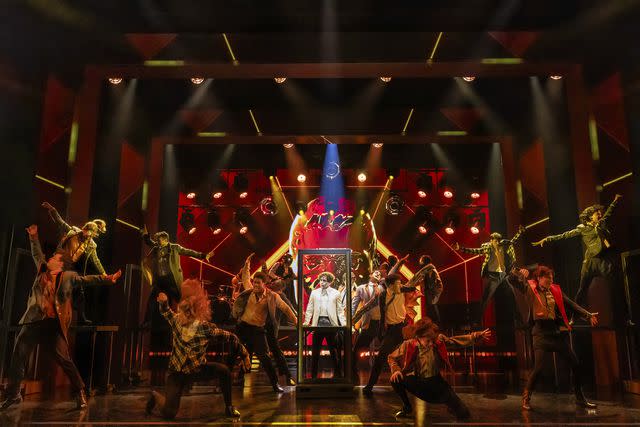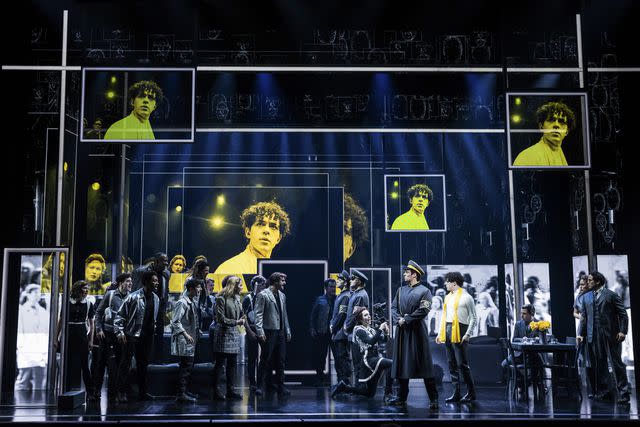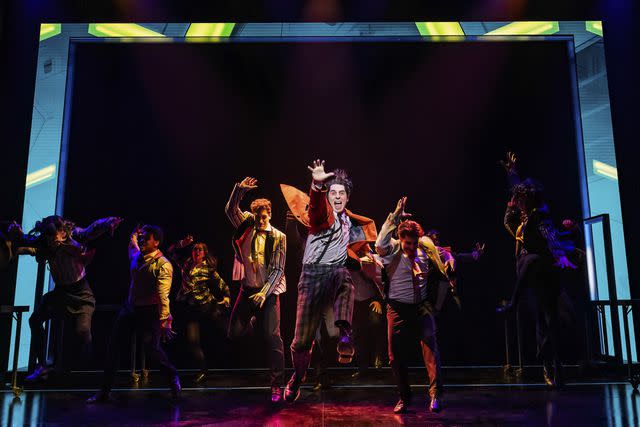“The Who's Tommy ”review: Pete Townshend's rock opera is a Broadway sensation
See it. Feel it. "The Who's Tommy" is back on Broadway in an electrifying revival that blends surreal projections with sensational choreography.
Can you feel it coming? A new vibration has hit Broadway, and dang, does it feel good. It’s been over thirty years since The Who’s Tommy, a rock opera based on the band’s 1969 landmark concept album, was brought to life in a thrilling Broadway production that won five Tony Awards, including Best Original Score for guitarist Pete Townshend and Best Director for Des McAnuff. Now, following a sold-out Chicago run, McAnuff and Townshend, who also serve as co-book writers, have teamed up once again for an electrifying, reimagined revival that remains faithful to its masterclass material, but also brings a few new spins to its titular pinball wizard’s tale.
The Who’s Tommy, which opened at the Nederlander Theater on Thursday, follows the amazing journey of a four-year-old named Tommy Walker (played at alternating performances by Cecilia Ann Popp and Olive Ross-Kline) whose life is forever changed after witnessing his father (Adam Jacobs) murder his mother’s lover in their home. When his parents discover that he’s privy to the crime, they swear Tommy to secrecy by telling him: “You didn’t hear it / You didn’t see it / You won’t say nothing to no one / Never in your life.”
In doing so, they seal his fate, as the horribly traumatized Tommy protects himself from the world by shutting off his senses and appearing as deaf and blind. As he grows older, Tommy is subjected to further abuse — including sexual assault by his Uncle Ernie (John Ambrosino) and vicious bullying by his Cousin Kevin (Bobby Conte) — but finds himself gaining an unexpected cult following after the world discovers that he’s really, really good at pinball.

Matthew Murphy and Evan Zimmerman
The cast of 'The Who's Tommy'If its avant-garde premise alone didn’t make it clear enough, The Who's Tommy is a surreal production that begs to be experienced by theatergoers, not simply viewed. One of the most wildly ambitious and creative productions on Broadway, the rock opera’s storyline is told almost entirely through the Who’s original lyrics with very minimal dialogue added to keep it afloat, and yet still manages to convey a solid, mostly coherent tale about the dangers of celebritydom and the lack of human connection within the world around us — problems that still feel as commonplace today as they did back in 1969.
From the moment the eldest version of Tommy (Ali Louis Bourzgui) decides to revisit his past, theatergoers are yanked back to the 1940s via David Korins’ stellar set design and Peter Nigrini’s phenomenal, retro-futuristic projections, which seamlessly transform the stage from the Walker family home to an aircraft filled with paratroopers to a World War II battlefield just in its overture alone.
Nigrini’s projections not only add an extra mind-bending element to an already-trippy production, but also appear shaped by Tommy’s memory — the exterior of his childhood home is worn and sketchy with time, while the youth center where he’s relentlessly bullied is nightmarish and inverted. While a brilliant addition to the musical, it’s worth noting that those seated on the sides of the Nederlander Theater could find themselves missing out on the full picture, so bear that in mind when grabbing tickets.

Matthew Murphy and Evan Zimmerman
The cast of 'The Who's Tommy'Fans of the Who will be happy to know that the orchestra has their amps turned all the way up in one of the loudest and most exhilarating productions to ever rock Broadway. Their knockout performances add an extra sense of oomph to Lorin Latarro’s stunning choreography, especially during standouts like “Pinball Wizard,” which features the production’s transcendent 17-person ensemble (many of whom are making their Broadway debut) leaping from tables and zigzagging their bodies back and forth as if being caught between the machine’s flippers. At other points, its cast can be seen bending over backwards in awe, twirling through the air, cruising by on skateboards, and, in one scene, even speeding across the stage on a moped.
Bourzgui, in his Broadway debut, is nothing short of a rockstar as the eldest version of Tommy. From the moment he walks onstage, it’s his to command as he balances the stoic nature of his character with his explosive energy during songs like “Sensation” and “I’m Free.” Jacobs and Alison Luff, who play Tommy’s parents, bring not only their incredible vocal ranges (Luff's growl during “Smash The Mirror” is a true highlight), but a great sense of love and conflict as they watch Tommy's struggle without being able to cure it.
In fact, it's the entire cast's energy and enthusiasm for the material that draws theatergoers deeper into the music and the madness unfolding onstage. Multiple attendees seated near me were all singing, bobbing their heads, and cheering so loudly throughout the performance that, by the time its final song arrived, they were already on their feet for a standing ovation before the cast could even begin to sing.

Matthew Murphy and Evan Zimmerman
The cast of 'The Who's Tommy'McAnuff, in his second time directing The Who's Tommy for Broadway, keeps the hits flowing at an absolute breakneck pace, but also understands when to slow things down for important plot reveals. A few new touches transform the musical’s futuristic final setting to feel more akin to the present day, especially with its not-so-subtle take on influencer culture and our propensity to record every single moment instead of actually living it. (Although, the use of livestream technology to paint Tommy’s surprised reactions onto the walls behind him did look quite cool.)
Still, Tommy does suffer from some hiccups. There are multiple moments within the production when so much is unfolding onstage — someone is singing, another person is being dragged away by robots, the ensemble is throwing one another into the air — that it can be hard to know exactly where to focus. While this may encourage others to attend a second, third, or fifth time to truly capture all of the musical’s nuances, it can be particularly overwhelming the first time around.
The second act also feels more rushed than the first, mostly due to its warp-speed timeskip toward the end that sees Tommy transform from an everyday pinball player into a hero figure. And, while Townshend's lyrics should seldom be deviated from, the book's dedication to its source material does prevent it from addressing some of its darker plot points too, like how Uncle Ernie's actions are never discussed outside of Tommy giving him a few pointed glares throughout the second act.
In 1975,Tommy was adapted into a deliciously delirious film that featured the tagline, “Your senses will never be the same.” Now, The Who's Tommy carries that torch forward in its own radical, one-of-a-kind adventure that truly has to be seen to be believed. See it, feel it — you won't forget it. Grade: B+
Sign up for Entertainment Weekly's free daily newsletter to get breaking TV news, exclusive first looks, recaps, reviews, interviews with your favorite stars, and more.
Related content:
Read the original article on Entertainment Weekly.

 Yahoo News
Yahoo News 
